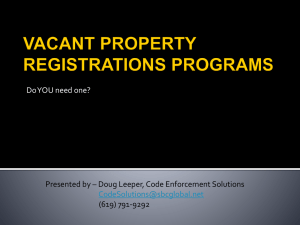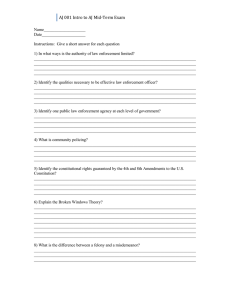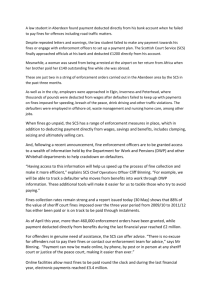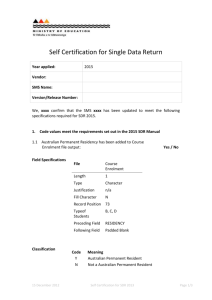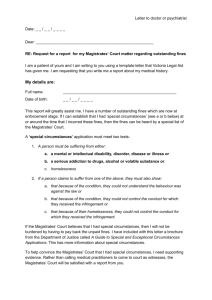YOUTH LEGAL CENTRE Fines and their enforcement Introduction
advertisement
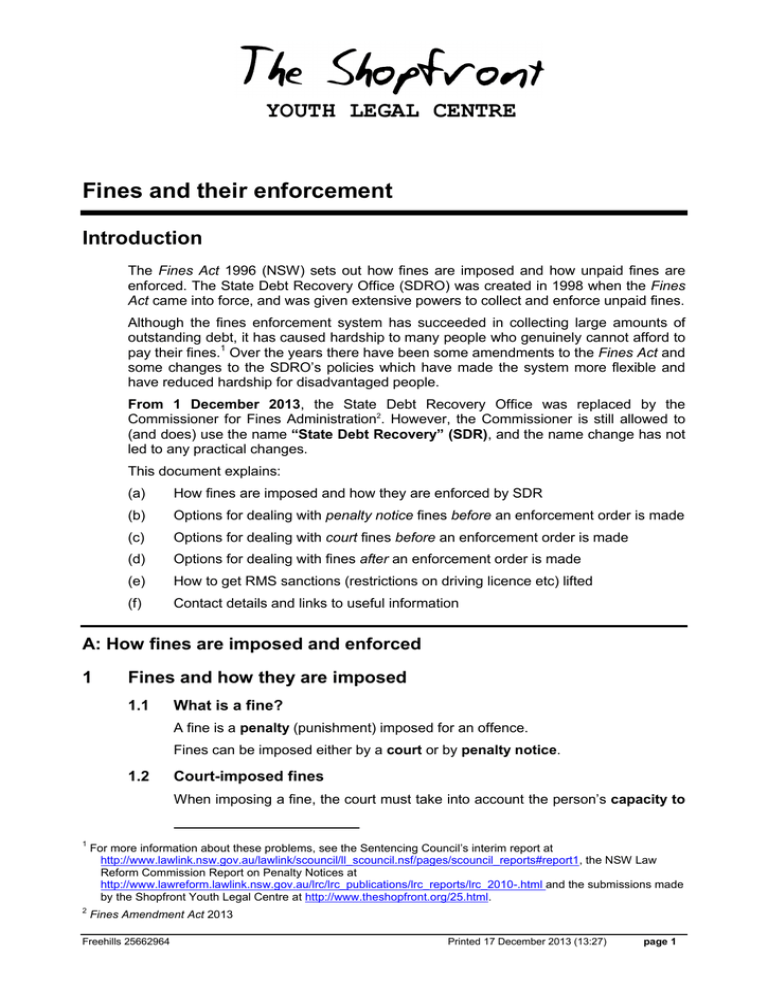
YOUTH LEGAL CENTRE Fines and their enforcement Introduction The Fines Act 1996 (NSW) sets out how fines are imposed and how unpaid fines are enforced. The State Debt Recovery Office (SDRO) was created in 1998 when the Fines Act came into force, and was given extensive powers to collect and enforce unpaid fines. Although the fines enforcement system has succeeded in collecting large amounts of outstanding debt, it has caused hardship to many people who genuinely cannot afford to pay their fines.1 Over the years there have been some amendments to the Fines Act and some changes to the SDRO’s policies which have made the system more flexible and have reduced hardship for disadvantaged people. From 1 December 2013, the State Debt Recovery Office was replaced by the Commissioner for Fines Administration2. However, the Commissioner is still allowed to (and does) use the name “State Debt Recovery” (SDR), and the name change has not led to any practical changes. This document explains: (a) How fines are imposed and how they are enforced by SDR (b) Options for dealing with penalty notice fines before an enforcement order is made (c) Options for dealing with court fines before an enforcement order is made (d) Options for dealing with fines after an enforcement order is made (e) How to get RMS sanctions (restrictions on driving licence etc) lifted (f) Contact details and links to useful information A: How fines are imposed and enforced 1 Fines and how they are imposed 1.1 What is a fine? A fine is a penalty (punishment) imposed for an offence. Fines can be imposed either by a court or by penalty notice. 1.2 Court-imposed fines When imposing a fine, the court must take into account the person’s capacity to 1 For more information about these problems, see the Sentencing Council’s interim report at http://www.lawlink.nsw.gov.au/lawlink/scouncil/ll_scouncil.nsf/pages/scouncil_reports#report1, the NSW Law Reform Commission Report on Penalty Notices at http://www.lawreform.lawlink.nsw.gov.au/lrc/lrc_publications/lrc_reports/lrc_2010-.html and the submissions made by the Shopfront Youth Legal Centre at http://www.theshopfront.org/25.html. 2 Fines Amendment Act 2013 Freehills 25662964 Printed 17 December 2013 (13:27) page 1 Fines and their enforcement pay3. The magistrate or judge who imposes the fine cannot allow more than 28 days to pay4. However, the offender may apply for further time to pay the fine to the registrar of the court, and the fine may be paid off by instalments at the court5. Written notice of the fine must be given to the offender6. This is usually mailed out about a week after the court date. If the fine remains unpaid after time to pay has expired, the registrar of the court refers the fine to SDR for the issue of an enforcement order7. 1.3 Penalty notices A penalty notice (also called an infringement notice) is an on-the-spot fine issued by an appropriate officer (eg a police officer, transit officer, parking inspector, council ranger)8. The amount of the penalty notice (often called the prescribed penalty) is set out in the relevant Act or Regulations. It is usually less than the maximum penalty, which is the maximum fine that can potentially be imposed at court. The issuing agency may decide to issue a caution instead of a penalty notice9. A penalty notice may not be issued to a child who was under 10 at the time of the alleged offence10. The Police (and some other agencies including RailCorp) have a policy of not issuing them to children under 14. Penalty notices are administered by SDR11. If the penalty notice is unpaid after the due date (21 days), and you do not elect to have the matter heard by a court, SDR will issue a reminder notice giving you a further 28 days to pay. If the fine is still unpaid (or other action such as a court election has not been taken), SDR issues an enforcement order.12 1.4 Application of Fines Act to court costs and victims support levies The Fines Act applies not only to fines but to other charges such as court costs and Victims’ Support Levies13 . 3 Section 6 4 Section 7 5 Sections 10, 11 6 Section 9 7 Sections 12 - 17 8 Sections 19-39 9 Sections 19A, 19B. These sections were introduced by the Fines Further Amendment Act 2008 and commenced on 31 March 2010. See also SDR cautioning guidelines at http://www.sdro.nsw.gov.au/lib/docs/misc/br_001.pdf 10 Section 53 11 The old Infringement Processing Bureau (IPB), which used to be part of the NSW Police, is now part of SDR. 12 Sections 40-56. 13 Section 4. Under section 105 of the Victims Rights and Support Act 2013, a Victims Support Levy is imposed on everyone found guilty of an offence, with a few exceptions for minor offences. As at July 2013, the levy is $69 for Local and Children’s Court matters and $156 for District and Supreme Court matters, and increases in line with the CPI at the end of each financial year. From 13 May 2013, Section 211A of the Criminal Procedure Act imposes a compulsory court costs levy on people found guilty in most Local Court matters. As of July 2013, the amount of the levy is $83. The court can waive both these levies for people under 18. Freehills 25662964 Printed 17 December 2013 (13:27) page 2 Fines and their enforcement 1.5 Application of Fines Act to sobering up centre charges (from 1 July 2013) The Intoxicated Persons (Sobering Up Centres Trial) Act 2013 set up some trial “sobering up centres” from 1 July 2013. The police have the power to take an intoxicated person to a sobering up centre. Not only can this be done against the person’s will, but the person will be charged a fee. A person can apply to the Local Court to have this fee waived, but must do so within 28 days. The fee is deemed to be a fine and can be enforced by State Debt Recovery14. However, SDR cannot impose any enforcement costs15 (see section A 2.2 of this document), RMS sanctions or imprisonment (see sections A 3.1 and A 3.4 of this document)16. There is more information available on the SDR website17. 1.6 Application of Fines Act to victims compensation restitution debts (from 1 December 2013) If a victim of violent crime is awarded a payment by Victims Services18, an offender who has been convicted of the offence may be ordered to pay this amount. This is called restitution. The Fines Amendment Act 2013, which commenced on 1 December 2013, introduced a trial scheme for enforcing restitution debts owing to Victims Services. Only some restitution debts will be referred by Victims Services to SDR. They are deemed to be fines19 and can be enforced by SDR. However, a person cannot be imprisoned for failing to pay a restitution debt20. 1.7 Debts that the Fines Act does not apply to The Fines Act does not apply to civil debts or to compensation ordered by a court (for example, when you are ordered to pay money to someone to fix the damage you caused to their property). It is up to the creditor (the person you owe money to) to recover these debts, with the help of the court system if necessary. 2 Enforcement orders 2.1 Making of enforcement order When a penalty notice or court fine (or other amount to which the Fines Act applies) is referred for enforcement, SDR makes an enforcement order. SDR sends the fine defaulter a copy of the enforcement order21. It includes details of: the amount payable; 14 Intoxicated Persons (Sobering up Centres Trial) Act 2013 section18 15 Intoxicated Persons (Sobering up Centres Trial) Regulation clause 9 16 Intoxicated Persons (Sobering up Centres Trial) Act 2013 section18(3) 17 http://www.sdro.nsw.gov.au/lib/docs/forms/suc_factsheet.pdf 18 Under the Victims Rights and Support Act 2013, which commenced in May 2013 and replaced the Victims Support and Rehabilitation Act 19 Fines Act section 135 20 Fines Act section 135(7) 21 Sections 59-64 Freehills 25662964 Printed 17 December 2013 (13:27) page 3 Fines and their enforcement 2.2 the fact that the fine defaulter has 28 days to pay or to take other action (eg, make a time-to-pay arrangement); the possibility of further costs being incurred if enforcement action is taken; and the fact that review options are available. Enforcement costs SDR usually imposes an enforcement cost of $65 (or $25 for fines incurred when under 18)22. 2.3 Early enforcement It is possible to avoid enforcement costs by applying to SDR for early enforcement, and then making a time-to-pay arrangement or applying for a Work and Development Order (see sections D1 and D5 of this document). There may be other options, depending on the fine defaulter’s situation. For more information about time to pay and other options, see section D of this document. 2.4 Use of private debt collectors to collect fines SDR has recently started using external debt collection agencies to help recover overdue fines debts. These agencies will attempt to make contact with fine defaulters to discuss options to repay the debt, but they are not permitted to receive any payments. All payments will continue to be made to SDR. For more information, see the SDR website23. 3 Enforcement action by SDR If the fine defaulter does not respond to an enforcement order or keep up with payments, SDR may proceed with enforcement action. There are four stages of enforcement action. Each stage incurs an extra enforcement cost. The costs are $40 for RMS sanctions and $65 for each step after that24. If all of the fines were incurred when under 18, no enforcement costs will be charged25. To stop enforcement action, there are a few things a fine defaulter can do, which are explained in Sections B – E of this document. If possible this should be done within 28 days of receiving the Enforcement Order. If this is not possible, and enforcement action has already commenced, a fine defaulter should contact SDR or get legal advice as soon as possible. 3.1 RMS sanctions 26 If the fine is not paid by the due date and the fine defaulter does not apply for time to pay, the fine is referred to Roads and Maritime Services (formerly known as the Roads and Traffic Authority (RTA) and referred to in this document as the RMS). The RMS may: 22 Sections 12-17, 40-47 23 See http://sdro.nsw.gov.au/about/news/20130415_debt_partnerships.php 24 Fines Regulation 2010, clause 4 25 Section 102A 26 Sections 65-70 Freehills 25662964 Printed 17 December 2013 (13:27) page 4 Fines and their enforcement suspend your driving licence without notice (unless the fines are non-traffic fines incurred when you were under 18). cancel your licence if the fine remains unpaid for 6 months27. If you don’t have a licence for them to suspend or cancel, cancel your vehicle registration prevent you from applying for or getting a licence put in place a “customer business restriction”. This means that, if directed to by SDR, the RMS must refuse to deal with the fine defaulter regarding the functions listed in section 68(2). This includes such things as issuing or renewing licences or registrations, transferring registrations, issuing number plates and licence testing. The RMS may not: refuse to issue a photo ID/proof of age card; or suspend or cancel your licence for non-traffic fines incurred when you were under 1828. However, other types of RMS sanctions may still be imposed, for example, cancelling your registration, or preventing you from applying for a licence if you do not already have one. See section E1 for information about lifting RMS sanctions. 3.2 Civil enforcement29 If the fine remains unpaid after cancellation at the RMS, or the RMS is unable to match the fine to a licence or registration, the next stage is civil enforcement. SDR may: issue a property seizure order. This allows the Sheriff to repossess assets like furniture, TV or a vehicle within certain guidelines. The Sheriff, or another person executing the order, may require a person who they reasonably suspect to be the fine defaulter to give their name and address, and to produce identification. Failure to do so (without reasonable excuse) is an offence (maximum fine: $1,100)30. issue a garnishee order to forcibly take money out of the fine defaulter’s pay or bank account. SDR must leave a certain amount for the person to live on (this amount changes from time to time). SDR may approve a partial or full refund if the defaulter is now suffering hardship because of a garnishee order. SDR does not garnishee Centrelink payments. register the fine enforcement order as a charge on land where the amount exceeds $1,000. issue an examination summons requiring the fine defaulter to appear at a Local Court to be questioned about their assets and income. 27 A fine default cancellation of your vehicle registration does not cancel your vehicle insurance policy (Fines Act section 70) or your third-party insurance (Motor Accidents Compensation Act 1999, section 14). 28 Section 65(3) 29 Sections 71-77 30 Section 104 Freehills 25662964 Printed 17 December 2013 (13:27) page 5 Fines and their enforcement 3.3 Community Service Order31 SDR may make a Community Service Order (CSO) if it is satisfied that: civil enforcement has not been successful, or is unlikely to be successful; and the fine defaulter is capable of performing work under the CSO. Whether someone is capable of performing a CSO is assessed by the Probation and Parole Service. The cut-out rate for community service work is $15 per hour, up to a maximum of 300 hours (for an adult) or 100 hours (for a child) on any one order. It is the person's age at the time of the CSO being imposed (not at the time the fine was imposed) that is relevant. Adults do their fine-default CSOs cumulatively; children do them concurrently32. The fine defaulter may satisfy the order by completing the work or may pay the amount outstanding at any time. If the fine defaulter fails to comply with the CSO, SDR may revoke the order and notify the fine defaulter, who may apply to have the revocation reversed33. In practice, hardly any CSOs are made for fine defaulters. However, some fine defaulters may be able to “work off” their fines with a Work and Development Order (see section D5 of this document). 3.4 Imprisonment34 If a CSO is revoked, SDR may then issue a warrant of commitment for the imprisonment of the fine defaulter for the applicable period. The rate is one day’s imprisonment for every $120 owing35. A police officer may execute the warrant, ie: arrest the fine defaulter. The police may (in accordance with certain guidelines) delay the execution of the warrant to enable the fine defaulter to pay the fine or seek cancellation of the warrant. The fine defaulter can avoid imprisonment by paying the full amount outstanding. A police officer executing a warrant may require a person who they reasonably suspect to be the fine defaulter to give their name and address, and to produce identification. Failure to do so (without reasonable excuse) is an offence (maximum fine: $1,100). The police officer must first warn the person that failure to provide details is an offence36. The imprisonment may be served by full-time imprisonment or by periodic detention (weekend or midweek). Multiple terms of default imprisonment are served consecutively (ie if a person owes 2 fines of $200 and $400 respectively, he or she will serve 2+4=6 days), but are concurrent with any term of non-fine default imprisonment (this means that people can still cut out their warrants while they are serving a sentence). There are special provisions for juveniles. If someone was under 18 at the time of the offence (and under 21 when charged or issued with a penalty notice) 31 Sections 78-86 32 Section 81 33 Section 86 34 Sections 87-97 35 Section 90 36 Section 104 Freehills 25662964 Printed 17 December 2013 (13:27) page 6 Fines and their enforcement they cannot be locked up for defaulting on the fine, unless they have adult fine default warrants as well, in which case they will do time in an adult prison for the whole lot!37. In practice, hardly any fine defaulters have been imprisoned since the commencement of the Fines Act. This is because the fine defaulter must first fail to complete a community service order, and SDR rarely issues CSOs. B: Options for dealing with penalty notice fines before an enforcement order is made 1 Time to pay When the fine is still at penalty notice or reminder notice stage, SDR may allow more time to pay. SDR accepts payment by instalments while the fine is still at penalty notice stage, but only if the fine is paid off in full by the due date38. Payments can be made by mail (cheque or money order), phone (credit card), internet (credit card or billpay) or in person at a post office. At this stage, payments on penalty notices cannot be made via Centrepay (automatic deductions from Centrelink benefits) but anyone who wishes to pay by Centrepay can apply for early enforcement (see below). 2 Early enforcement for Centrepay or Work and Development Order A person who wants to pay off a penalty notice by Centrepay can apply for early enforcement39, which means the fine will be fast-tracked to the next stage and SDR will set up the Centrepay arrangement. This can be done on the phone or by completing a form 40. A person can also apply for early enforcement to set up a Work and Development Order (see section D5: Work and Development Order). Although this technically means that an enforcement order will be made (see section A2: Enforcement orders), no enforcement costs are imposed.41 A word of warning: a fine defaulter who chooses early enforcement will not be able to challenge the fine later by doing a court election or application for internal review 42. Although the Act does not appear to prevent annulment applications from being made in relation to these enforcement orders, we understand that SDR will not grant annulment applications if the fine defaulter has applied for early enforcement. 3 Court election If you want to challenge a penalty notice (because you believe you are not guilty or the amount of the fine is too high), you may send in a court election, either on-line or by 37 Section 92 38 Section 33(2) 39 Section 42(1AA) 40 Early Enforcement to Pay by Instalments form: http://www.sdro.nsw.gov.au/lib/docs/forms/sdr_052.pdf 41 Fines Regulation 2010 Clause 4(2) 42 Section 42(1CC) Freehills 25662964 Printed 17 December 2013 (13:27) page 7 Fines and their enforcement post43. This may be done after you have already received the penalty reminder notice, but must be done before an enforcement order has been made44. The matter will be listed in the Local Court or Children’s Court, depending on your age and the type of offence. If you were under 18 at the time of the alleged offence, and are still under 21, you will go to the Children’s Court. There is an exception for traffic offences: if you were old enough to have a licence at the time of the offence (this means 16 for cars, and 16 and 9 months for motorbikes) you go to the Local Court unless you are also charged with a related non-traffic offence. Just like any criminal charge, you may plead guilty or not guilty (or, if you have a mental illness or intellectual disability, you may make an application under section 32 of the Mental Health (Forensic Provisions) Act). See the Shopfront’s separate material on Criminal Procedure for further information. 4 Special procedure for parking and traffic offences If you have received a penalty notice for a parking offence or a camera-detected traffic offence, but you were not driving the car at the time, the procedure for challenging the fine is different. Instead of sending in the court election, you must send to SDR a statutory declaration45 by the due date on the penalty reminder notice, stating the name and address of the person who was responsible for the car when the fine was incurred. The fine will then be sent to that person. If you don’t know who was driving, you must still send in a statutory declaration with as much information as possible46. 5 Internal review Instead of (or as well as) sending in a court election, you may ask for a review of the decision to issue a penalty notice47. This can be done by filling in an online request for review form48, completing a Request for review of a penalty notice form49, or writing a letter and sending it to SDR along with any supporting documents. SDR’s Review Guidelines50 may be helpful. The agency that issued the penalty notice may decide to51: withdraw it completely; give you a caution instead52; or allow the penalty notice to stand. In this situation you still have the opportunity to court-elect53 (if you have already sent in the court election form, this will be processed and you will be given a court date). 43 Online request for review form - https://www.apps06.osr.nsw.gov.au/customer_service/r4r#form/; review of penalty notice form - http://www.sdro.nsw.gov.au/lib/docs/forms/sdr_pn_015.pdf Request for 44 Sections 23A, 35, 36 45 Statutory Declaration – Individual - http://www.sdro.nsw.gov.au/lib/docs/forms/sdr_pn_031.pdf 46 Section 38 47 Sections 24A-24J. These sections were introduced by Fines Further Amendment Act 2008 and commenced on 31 March 2010. 48 Online request for review form - https://www.apps06.osr.nsw.gov.au/customer_service/r4r#form 49 Request for review of penalty notice form - http://www.sdro.nsw.gov.au/lib/docs/forms/sdr_pn_015.pdf 50 SDR Guidelines available on the SDR website - http://www.sdro.nsw.gov.au/lib/docs/misc/br_001.pdf 51 Section 24E(1) 52 Section 24G, sections 19A, 19B (these sections were introduced by Fines Further Amendment Act 2008 and commenced on 31 March 2010). Freehills 25662964 Printed 17 December 2013 (13:27) page 8 Fines and their enforcement An issuing agency must withdraw a penalty notice if54: the penalty notice was issued contrary to law; the issue of the penalty notice involved a mistake of identity; the penalty notice should not have been issued, having regard to the exceptional circumstances relating to the offence; you have an intellectual disability, a mental illness, a cognitive impairment or are homeless, and are unable to understand that your conduct constituted an offence, or unable to control such conduct55; or an official caution should have been given instead of a penalty notice. C: Options for dealing with court fines before an enforcement order is made 1 Time to pay When imposing a fine, the court only allows 28 days to pay, but this can easily be extended by filling out an application form at the court. Courts accept payments in person over the counter, by cheque, by money order or by credit card. As long as you keep paying the instalments, there will not be any interest or extra costs added, and the fine will not be referred to SDR for enforcement. Whilst courts do not accept payments via Centrepay (direct debits from Centrelink benefits), a person who wishes to pay court fines by Centrepay can apply for early enforcement (see section B2 above and C2 below). 2 Early enforcement for Centrepay or Work and Development Order To make a Centrepay arrangement for court fines, contact the court to apply for early enforcement56 (see also section B2 above). The fine will be fast-tracked to SDR who will set up the Centrepay arrangement. A person can also apply for early enforcement to set up a Work and Development Order (see section D5: Work and Development Order). Although this technically means that an enforcement order will be made (see section A2: Enforcement orders), no enforcement costs are imposed57. Unlike early enforcement of penalty notices (which may affect a person’s rights to have the penalty notice reviewed), early enforcement of a court fine does not affect a person’s right to appeal or apply for annulment of the court’s decision (see sections C3, 4 and 5 below). 53 Section 24F 54 Section 24E(2) 55 Section 24E(2)(d). Internal reviews under this paragraph can also be done after an enforcement order has been made: see section D3 of this document. 56 Section 14(1A) 57 Fines Regulation 2010 clause 4(2) Freehills 25662964 Printed 17 December 2013 (13:27) page 9 Fines and their enforcement 3 Annulment application to court If the fine was imposed by a Local or Children's Court, and you were not present at court, you may apply to the court for an annulment58. The time limit for annulment applications is 2 years. You may make an annulment application to the court even if the fine has already been referred to SDR for enforcement. The court will annul the conviction and the fine if satisfied that: 4 you were not aware of the court proceedings until they were over; or you were hindered by accident, illness, misadventure or other cause from attending court; or it is in the interests of justice for it to be annulled (for example, if there is a real doubt about your guilt)59. Annulment application to Attorney-General If you were present when the fine was imposed, or you are outside the 2-year time limit for an annulment application to the court, you may be able to make an annulment application to the Minister (Attorney-General)60. You will have to show that there is a serious doubt about your guilt or your liability for a penalty61. 5 Appeal to court If you are not eligible to make an annulment application (eg because you were at court when the fine was imposed, and you are not disputing your guilt), you may challenge the fine by lodging an appeal to the District Court62. The time limit is 28 days (but can be extended to 3 months in special circumstances). You may appeal to the District Court even if the fine has been referred to SDR for enforcement. D: Options for dealing with unpaid fines after an enforcement order is made 1 Time to pay A fine defaulter may apply to SDR for time to pay at any time after an enforcement order is made and before a Community Service Order is issued63. 1.1 Methods of payment SDR accepts payments by Centrepay (see below), mail (cheque or money order), phone (credit card), online (credit card or billpay), or in person at a post office. 58 Crimes (Appeal and Review) Act 2001 Section 4 59 Crimes (Appeal and Review) Act 2001 Section 8 60 See http://www.lsb.lawlink.nsw.gov.au/lsb/legal_services_review_annul/legal_services_review_conviction.html, and see the end of this document for contact details. 61 Crimes (Appeal and Review) Act section 5 62 Crimes (Appeal and Review) Act section 11 63 Section 100 Freehills 25662964 Printed 17 December 2013 (13:27) page 10 Fines and their enforcement 1.2 Centrepay If you wish to pay by Centrepay (fine payments deducted directly from Centrelink benefits) this can be set up either by calling SDR or filling out a Centrepay deductions form64. 1.3 Other time to pay applications If you are not on Centrelink benefits, you may be able to set up a time to pay arrangement on the phone to SDR, or they may require you to fill in a statement of financial circumstances form65. You will need to suggest of how much you can pay each week or fortnight. SDR will accept your instalment proposal if they think it is reasonable. This depends on your financial situation, how much you owe, and how long you will take to pay it off. SDR will often accept as little as $20 per fortnight. 1.4 Appeal to Fines Hardship Review Board If SDR knocks back your time to pay application, you may apply to the Fines Hardship Review Board (FHRB)66. The FHRB may direct that enforcement action be suspended pending its review. 2 Annulment application to SDR (penalty notice fines only) If you want to challenge a penalty notice, but SDR has already made an enforcement order, you may apply to SDR for an annulment67. If an annulment is granted, this usually means the matter will be listed in court, as if you had court-elected on the penalty notice. 2.1 How to make an annulment application To make an annulment application, you must send in an Annulment application form68 setting out the grounds (the reasons why you think the enforcement order should be annulled). It is also helpful to have supporting documents such as medical and social work reports. There is a $50 fee but SDR may waive it if it thinks it is appropriate (eg in cases of financial hardship)69. SDR will not usually waive the fee completely, but is often happy to charge just one $50 fee for multiple annulment applications. 2.2 Grounds for annulment application The law covering annulment applications was amended in June 200970 and it is now more difficult to have penalty notice enforcement orders annulled. SDR must annul the enforcement order if: 64 you were not aware of the fine until the enforcement order was made; or you were hindered by accident, illness or misadventure from taking action on the fine before it reached enforcement stage (homelessness and mental health problems are often accepted as illness or misadventure) Centrepay deductions form - http://www.sdro.nsw.gov.au/lib/docs/forms/sfs_cp_001.pdf 65 Statement of financial circumstances form - http://www.sdro.nsw.gov.au/lib/docs/forms/sdr_006.pdf 66 Sections 101A-101C, http://www.hrb.osr.nsw.gov.au/fines/faq 67 Sections 48-52 68 Annulment application form - http://www.sdro.nsw.gov.au/lib/docs/forms/sfs_eo_003.pdf 69 Fines Regulation 2010 clause 6 70 State Revenue Legislation Further Amendment Act 2009, Schedule 2(6), which commenced on 26 June 2009. Freehills 25662964 Printed 17 December 2013 (13:27) page 11 Fines and their enforcement but only if the annulment application was made within a reasonable time after you became aware of the fine, or after you stopped being hindered from doing something about it71. According to SDR, a reasonable time would usually be about 3 months, but may be as long as 12 months in some cases. SDR may annul the enforcement order if: 2.3 there is a doubt about your guilt or liability for the fine, but only if you have had no previous opportunity for this to be reviewed (this means that if you could have court-elected earlier on, but were simply too lazy to do so, you might have lost your chance to challenge the fine); or there is other just cause why the annulment should be granted; however, this cannot be used as a back-door way of getting your annulment application granted if you have not lodged it within a reasonable time72. If annulment application is granted If your enforcement order is annulled on the grounds that there is a doubt about your guilt or liability, SDR must refer the fine to the prosecuting authority (the organisation that issued the fine – eg Police, RailCorp) for them to decide whether to withdraw the fine or to proceed to court73. If an enforcement order is annulled, the fine does not simply disappear. Unless the prosecuting authority decides to withdraw the fine, the matter will be listed in court and it will proceed as if you had court-elected on the penalty notice74. If the magistrate finds the offence is not proven or dismisses the case you are not required to pay. If you are unsuccessful, the court will tell you what you owe, how to pay and your appeal options If your enforcement order is annulled, any RMS sanctions will be lifted. 2.4 If annulment application is refused If SDR refuses your annulment application, you may appeal to the Local Court within 28 days of SDR’s decision75 or set up an instalment plan before enforcement action recommences. While your appeal is pending, you may apply for any RMS sanctions to be lifted, and the RMS must lift them76. 3 Request for internal review (penalty notice fines only) Usually a request for a review of a penalty notice must be made before an enforcement order is made (see section B5: Internal review). However, you can apply for internal review after enforcement if: the fine was issued on or after 1 March 2010; and you have an intellectual disability, a mental illness, a cognitive impairment or are homeless, and are unable to understand that your conduct constituted an offence, or unable to control such conduct77; and 71 Section 49(1)(a) 72 Section 49(1)(b) 73 Section 49A 74 Section 51 75 Section 50 76 Section 69 77 Section 24E(2)(d) Freehills 25662964 Printed 17 December 2013 (13:27) page 12 Fines and their enforcement you did not apply for early enforcement of the penalty notice (see section B2: Early enforcement). This application can be made by writing a letter to SDR, setting out the applicant’s circumstances and attaching documents such as psychiatric or psychological reports, letters from social workers or homelessness support services. 4 Annulment application or appeal to court Please see part D2 of this document. The options outlined there are also available after an enforcement order has been made. 5 Work and Development Order A Work and Development Order (WDO) is a new option, introduced in July 2009 for a 2year trial period and now extended permanently78. It is more flexible, and available at an earlier stage, than a Community Service Order. There is some useful information about WDOs79, including a fact sheet80 and the Work and Development Order Guidelines81, on SDR’s website. 5.1 What is a Work and Development Order? A WDO is an order made by SDR requiring a person to do any one or more of the following: 5.2 undertake unpaid work for, or on behalf of, an “approved organisation”; undergo medical or mental health treatment in accordance with a health practitioner’s treatment plan; undertake an educational, vocational or life skills course; undergo financial or other counselling; undergo drug or alcohol treatment; or (if the person is under 25) undertake a mentoring program. Who is eligible for a Work and Development Order? You may be eligible for a WDO if you are having trouble paying your fines due to: 5.3 intellectual disability or cognitive impairment (eg brain injury); mental illness; homelessness; or acute economic hardship; or serious addiction to drugs, alcohol or volatile substances. Approved organisations and health practitioners A WDO application must be sponsored by an approved organisation, or in the case of mental health or medical treatment, a health practitioner qualified to provide that treatment. 78 Sections 99A-99J, introduced by Fines Further Amendment Act 2008. The sections on WDOs commenced on 10 July 2009. 79 For general information about WDOs see http://www.sdro.nsw.gov.au/fines/eo/wdo.php 80 Work and Development order factsheet - http://www.sdro.nsw.gov.au/lib/docs/forms/sfs_wdo_009.pdf 81 Work and Development order Guidelines - http://www.sdro.nsw.gov.au/lib/docs/misc/wdo_guidelines.pdf Freehills 25662964 Printed 17 December 2013 (13:27) page 13 Fines and their enforcement Organisations and health practitioners may apply to SDR to become an approved organisation (government or not-for-profit) or enrolled health practitioner82. 5.4 How to apply for a Work and Development Order You can apply for a WDO at any time after an enforcement order has been made, but before a CSO is made. An application must be made through an approved organisation or health practitioner. They can submit a WDO application on behalf of a client using the WDO Self Service portal.83 There is a list of approved organisations84 on the SDR website. Note that some approved organisations have chosen not to be on the list because they are only able to support WDO organisations for existing clients. 5.5 If your application is refused You may appeal to the Fines Hardship Review Board85. 5.6 Effect of a Work and Development Order Under a WDO, you “work off” or “cut out” your fines at the following rate: Unpaid work: $30 per hour, up to a maximum of 300 hours for over-18s or 100 hours for under-18s. Treatment, counselling, case management or mentoring: up to $1,000 per month. Vocational, educational or life skills courses: $50 per hour or $350 per day, up to a maximum of $1000 per month. If a WDO is granted, any SDR enforcement action is stopped and any RMS sanctions are lifted86. 5.7 If you don’t complete a Work and Development Order If you don’t finish a WDO, or if you finish the WDO but still have fines owing, you will still have to pay whatever is left. In some cases SDR may agree to write off the remaining fines or SDR could recommence enforcement action to recover the debt. Unlike a CSO, failure to complete a WDO does not lead to imprisonment. 6 “Write-off” or postponement 6.1 Power to write off fines SDR has power to “write off” unpaid fines in special circumstances87, and there are guidelines for writing off fines88. 82 Information for approved organisations and health practitioners is at http://www.sdro.nsw.gov.au/business/wdo.php 83 WDO Self Service portal - https://www.apps08.osr.nsw.gov.au/customer_service/wdo/index.php 84 List of approved organisations - http://www.sdro.nsw.gov.au/fines/eo/wdo.php 85 Sections 101A-101C, http://www.hrb.osr.nsw.gov.au/fines/faq 86 Section 9 of the Work and Development Order Guidelines found on the SDRO website http://www.sdro.nsw.gov.au/lib/docs/misc/wdo_guidelines.pdf 87 Section 101 88 Section 120. The Guidelines for Writing Off Fines are at http://www.sdro.nsw.gov.au/lib/docs/misc/guidelines_for_writing_off_fines.pdf Freehills 25662964 Printed 17 December 2013 (13:27) page 14 Fines and their enforcement However, a “write-off” does not mean getting rid of your fines completely, at least not straight away. Instead, it means that your fines are postponed for 5 years and may be written off completely after that89. For that reason, SDR now refers to a “write off” application as a “postponement” application. 6.2 Application for postponement SDR has information on how to apply for postponement and what sort of information you must provide90. You should send a letter to SDR with all the necessary information, as well as a Statement of Financial Circumstances form91. You should also attach any relevant reports and support letters, particularly if you are applying on the grounds of health or disability. There is a good chance of having fines postponed or written off if you can convince SDR that you are unlikely to ever be able to pay (or work off) the fine, because of a serious illness or disability or difficult domestic situation. Psychiatric or medical reports, financial statements and support letters are all very helpful in this situation. When considering a postponement application, SDR does not usually take into account any issues about your liability (guilt). 6.3 Effect of postponement “Write off” does not mean getting rid of your fines completely. Instead, SDR postpones them for 5 years. If your fines are postponed, RMS sanctions will usually be lifted so you will be eligible to get a licence, register a car, etc. After 5 years, if your financial circumstances have not improved and you don’t keep incurring new enforcement orders, the fines will then be written off completely. If you incur new fines during the 5-year period, you should deal with them promptly, preferably before they reach enforcement order stage. If you do receive new enforcement orders, SDR is sometimes prepared to postpone them as well, as long as you do not incur too many of them. If you incur too many enforcement orders, or your financial situation improves significantly, you could be required to pay all your fines. 6.4 Appeal to Fines Hardship Review Board If SDR refuses to write off your fines, you may apply to the Fines Hardship Review Board92, which may direct SDR to write off your fines. 7 Stay of enforcement orders It used to be possible to apply for a stay of enforcement for up to 12 months. This basically meant that enforcement action would be postponed or put on hold until the fine defaulter is in a better financial position. Now, a person who wants their enforcement orders stayed must instead apply for postponement (see section D6 above). 89 Section 101(4) 90 http://www.sdro.nsw.gov.au/fines/eo/postpone.php 91 Statement of Financial Circumstances form - http://www.sdro.nsw.gov.au/lib/docs/forms/sdr_006.pdf 92 Sections 101A-101C, http://www.hrb.osr.nsw.gov.au/fines/faq Freehills 25662964 Printed 17 December 2013 (13:27) page 15 Fines and their enforcement For fine defaulters who are in prison, SDR will usually stay enforcement until at least 3 months after release. A prison welfare officer will usually help inmates to complete the required form.93 8 Remission If you wish to have your fines completely wiped, you can apply to have them remitted94. Remission of fines can only be done by the Governor of NSW on the recommendation of the Attorney-General. According to information on the Lawlink website about remission of fines, you will first need to make an application to SDR to “write off” (meaning postpone) your unpaid fines95. If your write-off application is refused, it is not clear whether you then have to appeal to the Hardship Review Board before applying for remission. There do not appear to be any guidelines about remission of fines, but a remission is likely to be granted only in exceptional circumstances. E: How to get RMS (driving licence) sanctions lifted 1 Automatic lifting of sanctions RMS sanctions (see section A3.1 of this document) will automatically be lifted (meaning you can get your licence back, apply for a new licence, or re-register your car) if: 2 the fine is paid in full; you have made 6 regular payments on a time-to-pay arrangement, as long as you haven’t previously defaulted on any payments96; a Work and Development Order is made97; you have appealed to the Local Court against SDR’s refusal to grant an annulment application (for penalty notice enforcement orders); or have lodged an appeal or annulment application with the court (for court fine enforcement orders)98 ; or your fines have been postponed, written off or remitted99. Lifting of sanctions in other situations SDR may agree to lift RMS sanctions if: this is your first time-to-pay arrangement; you have applied for a Work and Development Order, annulment or write-off and are waiting for your application to be approved; you need to sell your car (and transfer your rego) to pay your fines; a licence is essential for your work; 93 Inmate Request for Information form - http://www.sdro.nsw.gov.au/lib/docs/forms/sdr_eo_008.pdf 94 Section 123 95 http://www.lsb.lawlink.nsw.gov.au/lsb/legal_services_review_annul/legal_services_remission_fines.html 96 Section 65(4A) 97 Section 99B(7) and Part 9 of the Work and Development Order Guidelines 98 Section 69 99 Section 101(3) Freehills 25662964 Printed 17 December 2013 (13:27) page 16 Fines and their enforcement you have special health/personal/family reasons for needing a licence; you reside in an remote location not serviced by public transport; or if there are extenuating circumstances. If you need a licence for work reasons, a support letter from your employer, saying why you need a licence, will help you convince SDR. If you are receiving assistance from a job placement agency, a letter from the agency confirming this, and confirming that a driving licence is needed to obtain employment, will assist. 3 If RMS sanctions are lifted If your RMS sanctions are lifted: If your licence or rego has been suspended, it will automatically be restored. If your licence or rego has been cancelled, you will have to re-apply for your licence or rego. If your licence has been cancelled for a long time you might have to do your knowledge test or driving test again. Whatever the situation, you must not drive until the RMS confirms it is OK. If you are in a time-to-pay arrangement or on a Work and Development Order, you will have to keep making regular payments or doing your WDO, or SDR may impose the sanctions again. F: Contact details and links 1 State Debt Recovery Penalty Notices Ph: 1300 138 118 Enforcement Orders Ph: 1300 655 805 WDO hotline Ph: 1300 478 879 Fax: (02) 6354 7271, (02) 6354 7302 (time to pay applications only) Correspondence: For fines at penalty notice stage: PO Box 786 Strawberry Hills NSW 2012 For fines at enforcement order stage: PO Box A2571 Sydney South NSW 1235 Website: www.sdro.nsw.gov.au (for useful information, fact sheets, and forms). If you work for an organisation which assists clients with outstanding fines, you may apply to SDR for an Advocacy Hotline. This gives lawyers and community workers a direct number to SDR without having to go through the call centre. For details of how to apply, contact SDR. 2 Fines Hardship Review Board (To appeal refusal of time to pay, WDO or postponement applications) GPO Box A2571, Sydney South NSW 1235 Ph: (02) 6354 7116 Fax: (02) 6354 7263 fineshrb@osr.nsw.gov.au http://www.hrb.osr.nsw.gov.au/ Freehills 25662964 Printed 17 December 2013 (13:27) page 17 Fines and their enforcement 3 Department of Attorney General and Justice (To apply for annulment of court fines where ineligible to apply to the court, and remission of unpaid fines) Justice Legal (formerly Legal Services Branch) Department of Attorney General and Justice GPO Box 6 Sydney NSW 2001 Ph: (02) 8224 5330 Fax: (02) 8224 5335 director_lsb@agd.nsw.gov.au Website: http://www.lsb.lawlink.nsw.gov.au/lsb/legal_services_contactus.html 4 Legal advice and information Legal Aid NSW provides legal advice and assistance with a range of legal issues, including fines. It can provide fines advice through its homeless outreach legal service and other civil law outreach services. To found out about your nearest Legal Aid office or outreach service, contact Law Access on 1300 888 529 or go to: http://www.legalaid.nsw.gov.au/ or http://www.legalaid.nsw.gov.au/what-we-do/civillaw/homeless-outreach-legal-service The Shopfront Youth Legal Centre is a free legal service for homeless and disadvantaged young people aged 25 and under. We can provide legal advice and assistance, including court representation, for young people with fines. Many Community Legal Centres will provide free advice about fines for people on low incomes. To find your nearest Community Legal Centre, please call 9212 7333 or go to http://www.CLCNSW.org.au. Fined Out is a community legal education resource provided by Inner City Legal Centre and Redfern Legal Centre. It's for anyone affected by fines in NSW. It helps you understand the system, gives you information about free legal and financial services, and helps you deal with your fine and get a better result. See http://iclc.org.au/fined_out/ (last updated November 2011). The Shopfront Youth Legal Centre Updated December 2013 The Shopfront Youth Legal Centre 356 Victoria Street Darlinghurst NSW 2010 Phone: (02) 9322 4808 Fax: (02) 9331 3287 shopfront@theshopfront.org www.theshopfront.org The Shopfront Youth Legal Centre is a service provided by Herbert Smith Freehills, in association with Mission Australia and The Salvation Army. This document was last updated in December 2013 and to the best of our knowledge is an accurate summary of the law in New South Wales at that time. This document provides a summary only of the subject matter covered, without the assumption of a duty of care. It should not be relied on as a substitute for legal or other professional advice.This document may be photocopied and distributed, or forwarded by email, on the condition that the document is reproduced in its entirety and no fee is charged for its distribution. Freehills 25662964 Printed 17 December 2013 (13:27) page 18
